airbag TOYOTA RAV4 2011 XA30 / 3.G Owners Manual
[x] Cancel search | Manufacturer: TOYOTA, Model Year: 2011, Model line: RAV4, Model: TOYOTA RAV4 2011 XA30 / 3.GPages: 536, PDF Size: 9.52 MB
Page 1 of 536
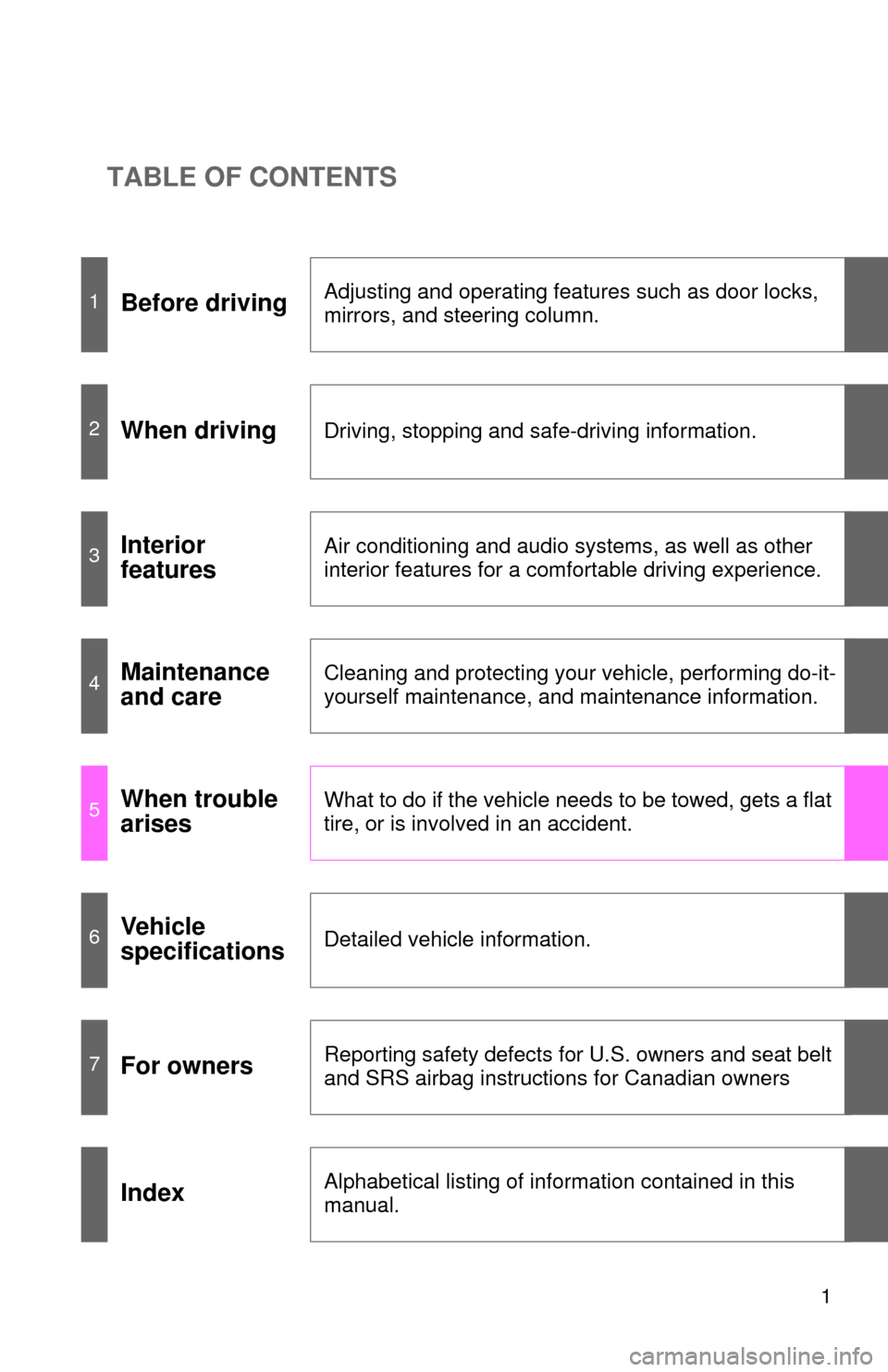
TABLE OF CONTENTS
1
1Before drivingAdjusting and operating features such as door locks,
mirrors, and steering column.
2When drivingDriving, stopping and safe-driving information.
3Interior
featuresAir conditioning and audio systems, as well as other
interior features for a comfortable driving experience.
4Maintenance
and careCleaning and protecting your vehicle, performing do-it-
yourself maintenance, and maintenance information.
5When trouble
arisesWhat to do if the vehicle needs to be towed, gets a flat
tire, or is involved in an accident.
6Vehicle
specificationsDetailed vehicle information.
7For ownersReporting safety defects for U.S. owners and seat belt
and SRS airbag instructions for Canadian owners
IndexAlphabetical listing of information contained in this
manual.
Page 2 of 536

TABLE OF CONTENTSIndex
2
1-1. Key informationKeys ..................................... 24
1-2. Opening, closing and locking the doors
Smart key system................. 26
Wireless remote control ....... 38
Side doors ............................ 42
Back door ............................. 46
1-3. Adjustable components (seats, mirrors,
steering wheel)
Front seats ........................... 49
Rear seats ............................ 54
Head restraints ..................... 65
Seat belts ............................. 68
Steering wheel ..................... 76
Anti-glare inside rear view mirror .................................. 77
Outside rear view mirrors ..... 79
1-4. Opening and closing the windows and moon roof
Power windows .................... 81
Moon roof ............................. 84
1-5. Refueling Opening the fuel tank cap .... 88 1-6. Theft deterrent system
Engine immobilizer system ................................ 92
Theft prevention labels (U.S.A.)............................... 95
1-7. Safety information Correct driving posture ......... 96
SRS airbags ......................... 98
Front passenger occupant classification system ......... 110
Child restraint systems ....... 116
Installing child restraints ..... 120
2-1. Driving procedures Driving the vehicle .............. 134
Engine (ignition) switch (vehicles with smart
key system) ...................... 143
Engine (ignition) switch (vehicles without smart
key system) ...................... 147
Automatic transmission ...... 150
Turn signal lever ................. 153
Parking brake ..................... 154
Horn .................................... 155
2-2. Instrument cluster Gauges and meters ............ 156
Indicators and warning lights ................................. 159
Trip information display ...... 162
1Before driving
2When driving
Page 5 of 536

1
2
3
4
5
6
7
5
If your vehicle needs to be towed ................................ 415
If you think something is wrong ................................ 422
Fuel pump shut off system .............................. 423
Event data recorder ............ 424
5-2. Steps to take in an emergency
If a warning light turns on or a warning buzzer
sounds... .......................... 426
If you have a flat tire (vehicles with standard
tires) .................................. 438
If you have a flat tire (vehicles with run-flat
tires) .................................. 457
If the engine will not start .... 458
If the shift lever cannot be shifted from P.................... 459
If you lose your keys ........... 460
If the electronic key does not operate properly
(vehicles with smart
key system)....................... 461
If the battery is discharged ........................ 463
If your vehicle overheats ..... 466
If the vehicle becomes stuck ................................. 468
If your vehicle has to be stopped in an
emergency ........................ 470 6-1. Specifications
Maintenance data (fuel, oil level, etc.) ........... 474
Fuel information.................. 486
Tire information .................. 489
6-2. Customization Customizable features........ 500
6-3. Initialization Items to initialize ................. 503
Reporting safety defects for U.S. owners ................ 506
Seat belt instructions for Canadian owners
(in French) ........................ 507
SRS airbag instructions for Canadian owners
(in French) ........................ 509
Abbreviation list ........................ 520
Alphabetical index .................... 522
What to do if... .......................... 533
6Vehicle specifications
7For owners
Index
Page 8 of 536
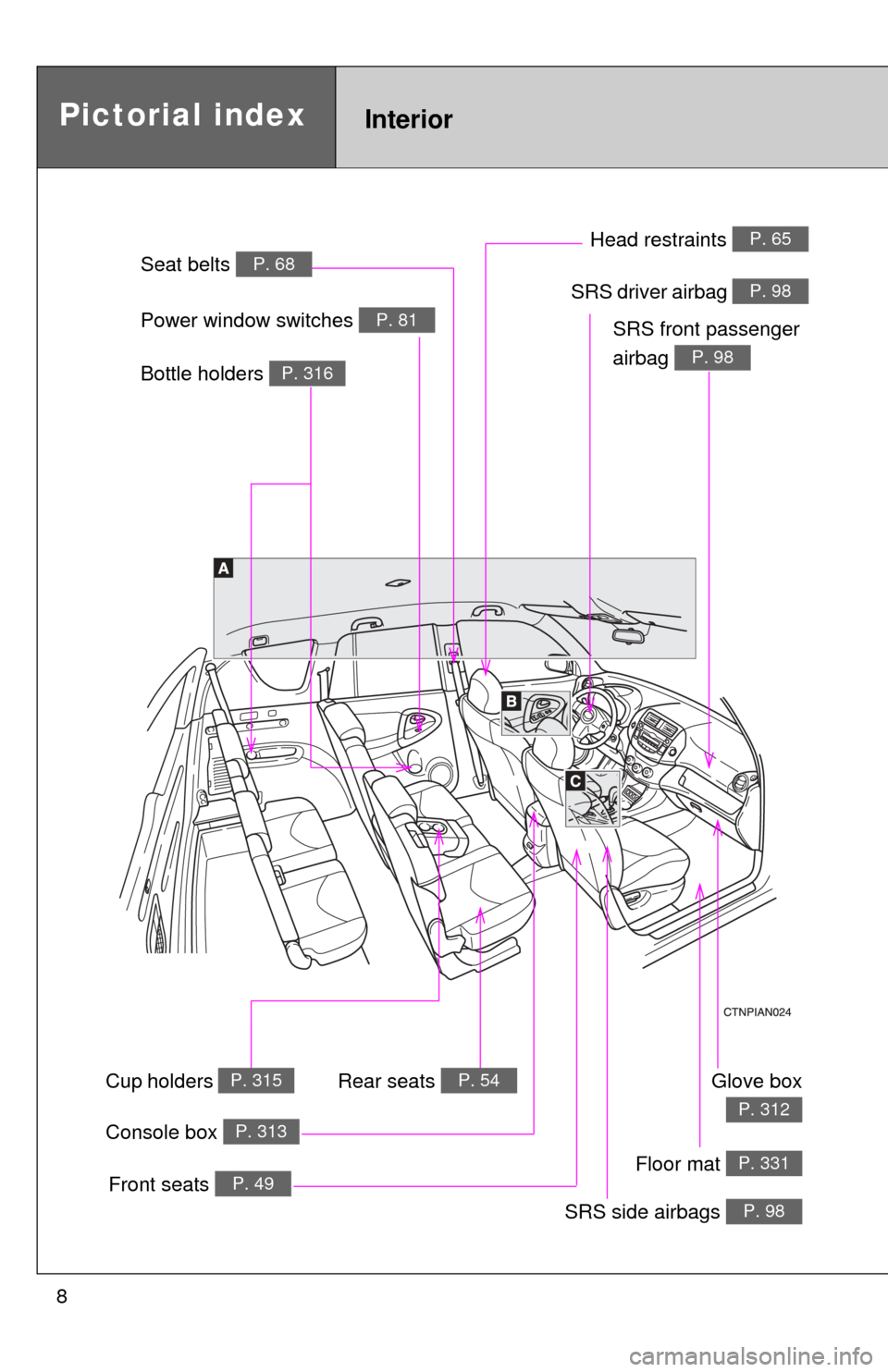
8
Glove box
P. 312
Front seats P. 49
SRS side airbags P. 98
Power window switches P. 81SRS front passenger
airbag
P. 98
SRS driver airbag P. 98
Console box P. 313
InteriorPictorial index
Floor mat P. 331
Head restraints P. 65
Bottle holders P. 316
Seat belts P. 68
Rear seats P. 54Cup holders P. 315
Page 9 of 536
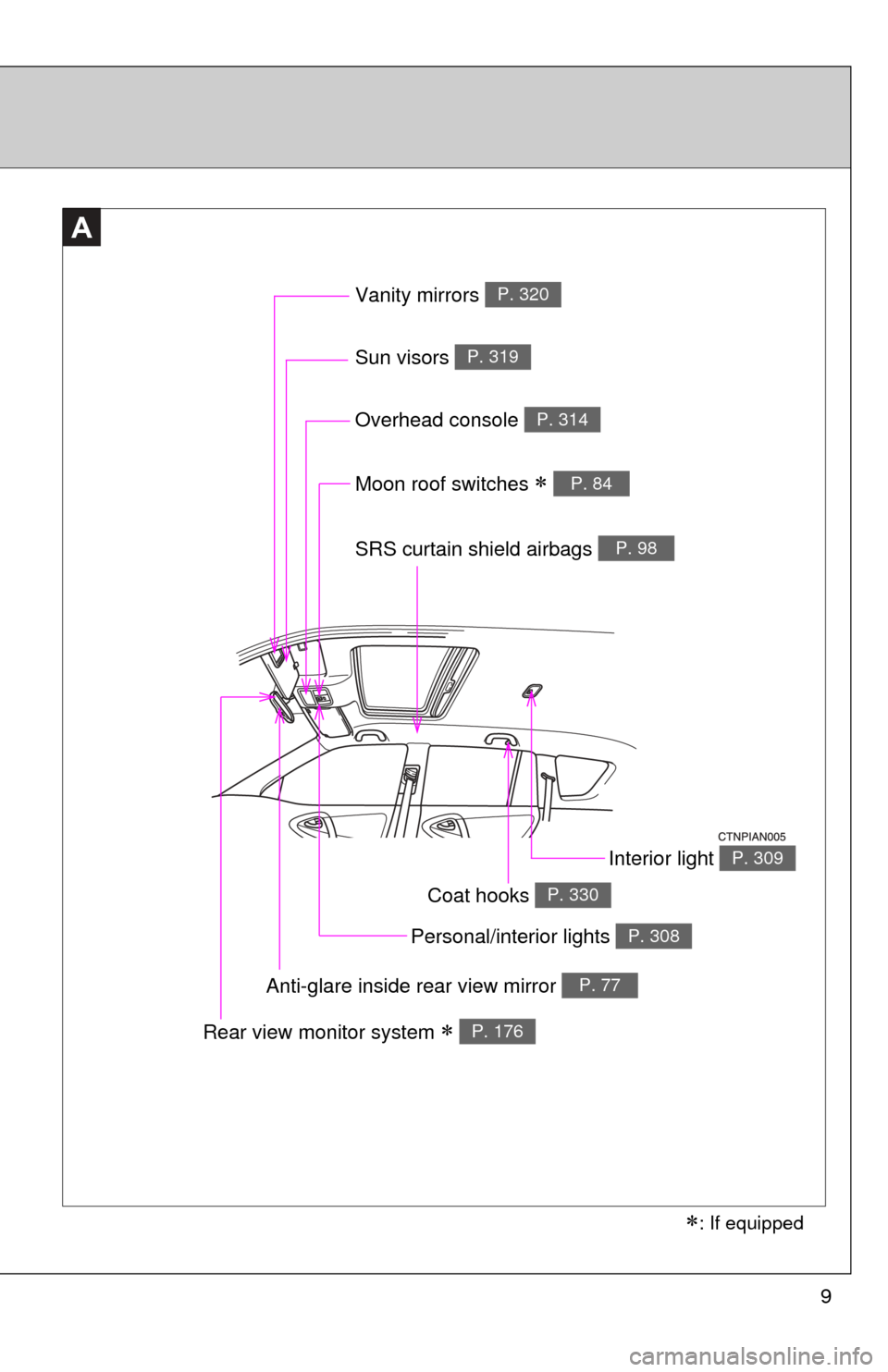
9
A
Vanity mirrors P. 320
Moon roof switches P. 84
Sun visors P. 319
SRS curtain shield airbags P. 98
: If equipped
Interior light P. 309
Anti-glare inside rear view mirror P. 77
Personal/interior lights P. 308
Overhead console P. 314
Rear view monitor system P. 176
Coat hooks P. 330
Page 19 of 536

19
Installation of a mobile two-way radio system
As the installation of a mobile two-way radio system in your vehicle may
affect electronic systems such as the multi-port fuel injection system/sequen-
tial multi-port fuel injection system, cruise control system, anti-lock brake
system, SRS airbag system or seat belt pretensioner system, be sure to
check with your Toyota dealer for precautionary measures or special instruc-
tions regarding installation.
Scrapping of your Toyota
The SRS airbag and seat belt pretensioner devices in your Toyota contain
explosive chemicals. If the vehicle is scrapped with the airbags and seat belt
pretensioners left as they are, this may cause an accident such as fire. Be
sure to have the systems of the SRS airbag and seat belt pretensioner
removed and disposed of by a qualified service shop or by your Toyota
dealer before you scrap your vehicle.
Perchlorate Material
Special handling may apply, See www.dtsc.ca.gov/hazardouswaste/perchlorate.
Your vehicle has components that may contain perchlorate. These compo-
nents may include airbag, seat belt pretensioners, and wireless remote con-
trol batteries.
Page 23 of 536
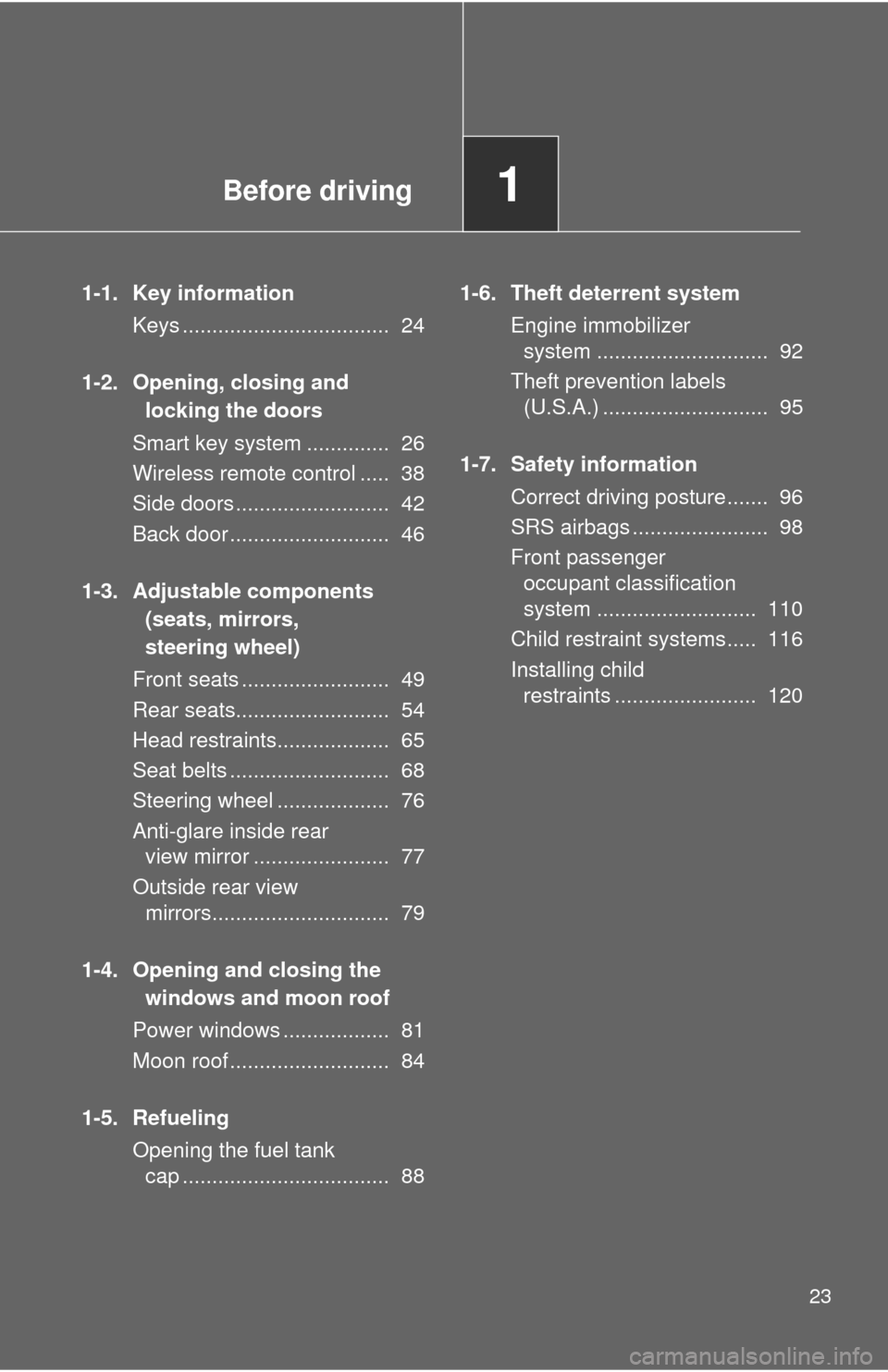
Before driving1
23
1-1. Key informationKeys ................................... 24
1-2. Opening, closing and locking the doors
Smart key system .............. 26
Wireless remote control ..... 38
Side doors .......................... 42
Back door ........................... 46
1-3. Adjustable components (seats, mirrors,
steering wheel)
Front seats ......................... 49
Rear seats.......................... 54
Head restraints................... 65
Seat belts ........................... 68
Steering wheel ................... 76
Anti-glare inside rear view mirror ....................... 77
Outside rear view mirrors.............................. 79
1-4. Opening and closing the windows and moon roof
Power windows .................. 81
Moon roof ........................... 84
1-5. Refueling Opening the fuel tank cap ................................... 88 1-6. Theft deterrent system
Engine immobilizer system ............................. 92
Theft prevention labels (U.S.A.) ............................ 95
1-7. Safety information Correct driving posture....... 96
SRS airbags ....................... 98
Front passenger occupant classification
system ........................... 110
Child restraint systems..... 116
Installing child restraints ........................ 120
Page 98 of 536
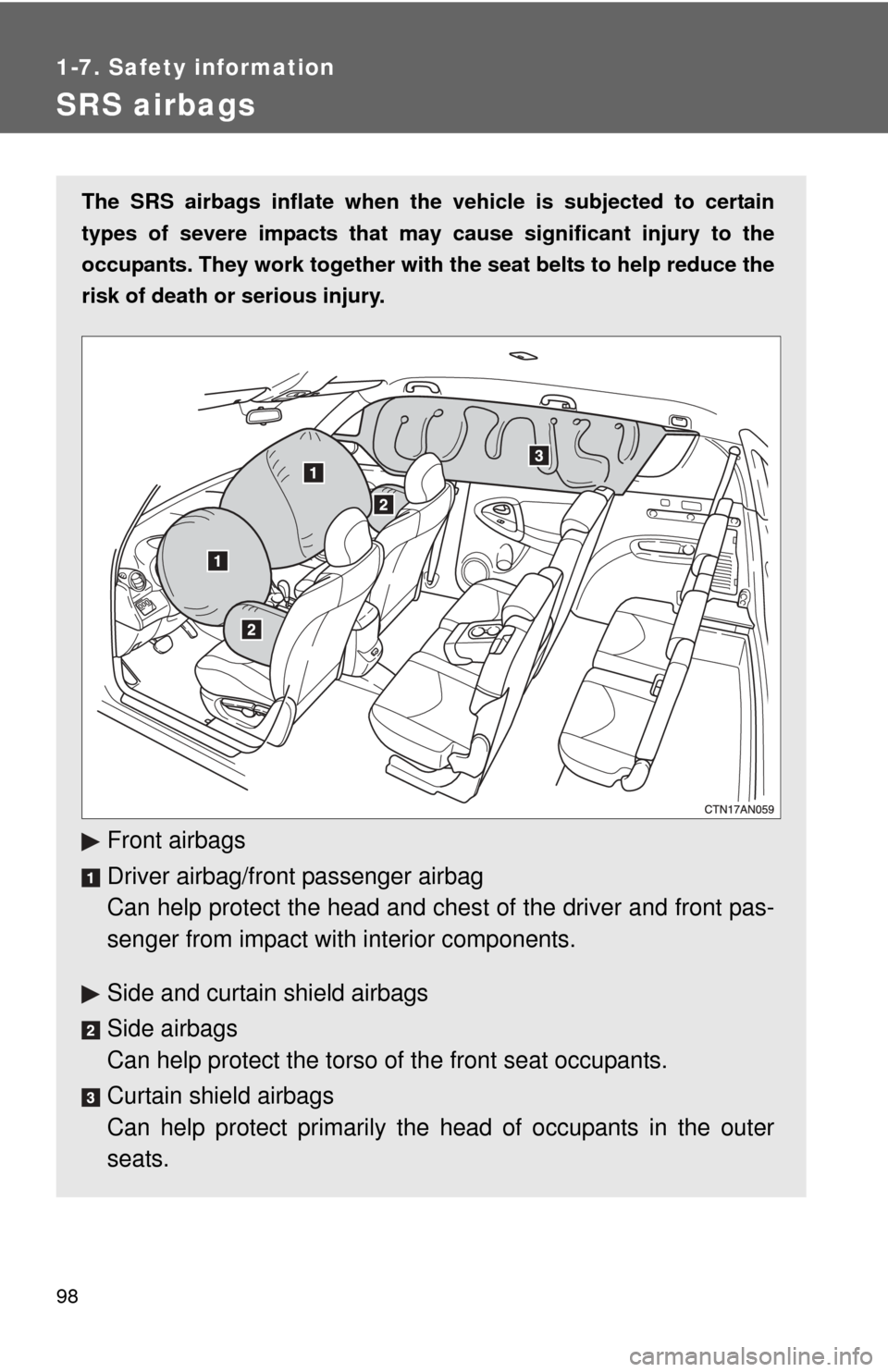
98
1-7. Safety information
SRS airbags
The SRS airbags inflate when the vehicle is subjected to certain
types of severe impacts that may cause significant injury to the
occupants. They work together with the seat belts to help reduce the
risk of death or serious injury.
Front airbags
Driver airbag/front passenger airbag
Can help protect the head and ches t of the driver and front pas-
senger from impact with interior components.
Side and curtain shield airbags
Side airbags
Can help protect the torso of the front seat occupants.
Curtain shield airbags
Can help protect primarily the head of occupants in the outer
seats.
Page 99 of 536
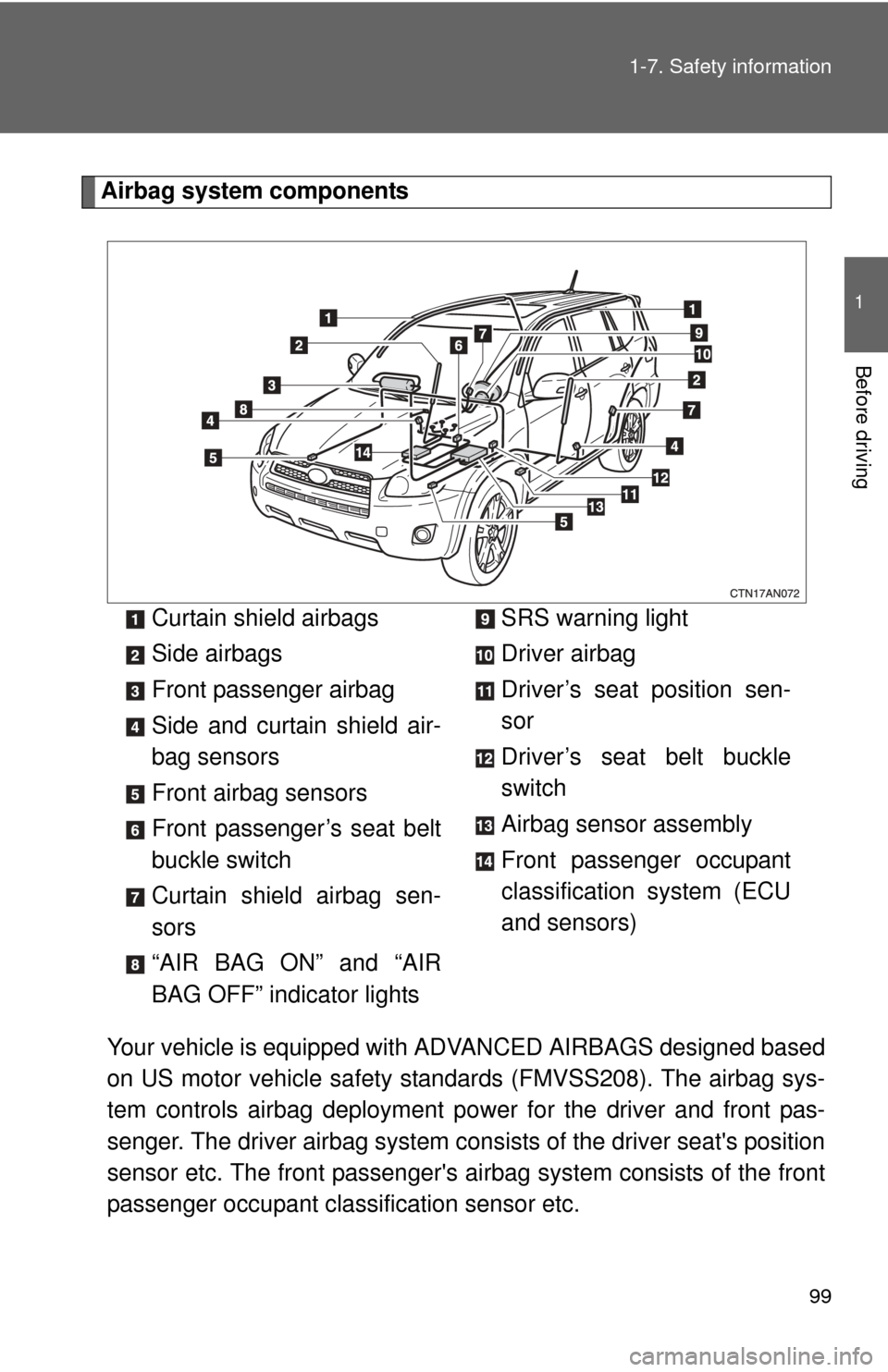
99
1-7. Safety information
1
Before driving
Airbag system components
Your vehicle is equipped with ADVANCED AIRBAGS designed based
on US motor vehicle safety standards (FMVSS208). The airbag sys-
tem controls airbag deployment po wer for the driver and front pas-
senger. The driver airbag system cons ists of the driver seat's position
sensor etc. The front passenger's ai rbag system consists of the front
passenger occupant classification sensor etc. Curtain shield airbags
Side airbags
Front passenger airbag
Side and curtain shield air-
bag sensors
Front airbag sensors
Front passenger’s seat belt
buckle switch
Curtain shield airbag sen-
sors
“AIR BAG ON” and “AIR
BAG OFF” indicator lights
SRS warning light
Driver airbag
Driver’s seat position sen-
sor
Driver’s seat belt buckle
switch
Airbag sensor assembly
Front passenger occupant
classification system (ECU
and sensors)
Page 100 of 536

100 1-7. Safety information
The main SRS airbag system components are shown above. The
SRS airbag system is controlled by the airbag sensor assembly. The
airbag sensor assembly consists of a safing sensor and an airbag
sensor.
In certain types of severe frontal or side impacts, the SRS airbag sys-
tem triggers the airbag inflators. A chemical reaction in the inflators
quickly fills the airbags with non-toxic gas to help restrain the motion
of the occupants.
■ SRS warning light
This warning light system monitors the airbag sensor assembly, front airbag
sensors, side and curtain shield airbag sensors, curtain shield airbag sen-
sors, driver's seat position sensor, driver's seat belt buckle switch, front pas-
senger occupant classification system, “AIR BAG ON” and “AIR BAG OFF”
indicator lights, front passenger’s seat belt buckle switch, seat belt preten-
sioner assemblies, inflators, interconnecting wiring and power sources. ( P.
427)
■ If the SRS airbags deploy (inflate)
●Bruising and slight abrasions may result from contact with a deploying
(inflating) SRS airbag.
● A loud noise and white powder will be emitted.
● Parts of the airbag module (steering wheel hub, airbag cover and inflator)
as well as the front seats, and parts of the front and rear pillars and roof
side rail, may be hot for several minutes. The airbag itself may also be
hot.
● The windshield may crack.